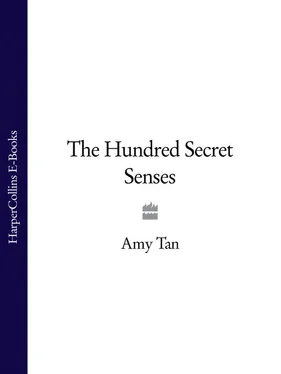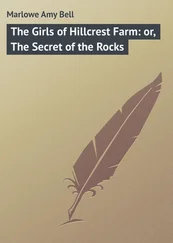All the Hakkas in Thistle Mountain admired her, and not just because she robbed Punti people. She was the first Hakka bandit to join the struggle for Great Peace when the Heavenly King came back to us for help. In the spring, she took an army of Hakka maidens to Guilin, and the Manchus captured her. After they cut off her head, her lips were still moving, cursing that she would return and ruin their families for one hundred generations. That was the summer I lost my eye. And when I told everyone about Nunumu galloping by on her ghost horse, people said this was a sign that Nunumu had chosen me to be her messenger, just as the Christian God had chosen a Hakka man to be the Heavenly King. They began to call me Nunumu. And sometimes, late at night, I thought I could truly see the Bandit Maiden, not too clearly, of course, because at that time I had only one yin eye.
Soon after that, I met my first foreigner. Whenever foreigners arrived in our province, everyone in the countryside – from Nanning to Guilin – talked about them. Many Westerners came to trade in foreign mud, the opium that gave foreigners mad dreams of China. And some came to sell weapons – cannons, gunpowder, rifles, not the fast, new ones, but the slow, old kind you light with a match, leftovers from foreign battles already lost. The missionaries came to our province because they heard that the Hakkas were God Worshippers. They wanted to help more of us go to their heaven. They didn’t know that a God Worshipper was not the same as a Jesus Worshipper. Later we all realized our heavens were not the same.
But the foreigner I met was not a missionary. He was an American general. The Hakka people called him Cape because that’s what he always wore, a large cape, also black gloves, black boots, no hat, and a short gray jacket with buttons – like shiny coins! – running from the waist to his chin. In his hand he carried a long walking stick, rattan, with a silver tip and an ivory handle carved in the shape of a naked woman.
When he came to Thistle Mountain, people from all the villages poured down the mountainsides and met in the wide green bowl. He arrived on a prancing horse, leading fifty Cantonese soldiers, former boatmen and beggars, now riding ponies and wearing colorful army uniforms, which we heard were not Chinese or Manchu but leftovers from wars in French Africa. The soldiers were shouting, ‘God Worshippers! We are God Worshippers too!’
Some of our people thought Cape was Jesus, or, like the Heavenly King, another one of his younger brothers. He was very tall, had a big mustache, a short beard, and wavy black hair that flowed to his shoulders. Hakka men also wore their long hair this way, no pigtail anymore, because the Heavenly King said our people should no longer obey the laws of the Manchus. I had never seen a foreigner before and had no way of knowing his true age. But to me, he looked old. He had skin the color of a turnip, eyes as murky as shallow water. His face had sunken spots and sharp points, the same as a person with a wasting disease. He seldom smiled, but laughed often. And he spoke harsh words in a donkey bray. A man always stood by his side, serving as his go-between, translating in an elegant voice what Cape said.
The first time I saw the go-between, I thought he looked Chinese. The next minute he seemed foreign, then neither. He was like those lizards that become the colors of sticks and leaves. I learned later this man had the mother blood of a Chinese woman, the father blood of an American trader. He was stained both ways. General Cape called him yiban ren , the one-half man.
Yiban told us Cape had just come from Canton, where he became friends with the Heavenly King of the Great Peace Revolution. We were all astounded. The Heavenly King was a holy man who had been born a Hakka, then chosen by God to be his treasured younger son, little brother to Jesus. We listened carefully.
Cape, Yiban said, was an American military leader, a supreme general, the highest rank. People murmured. He had come across the sea to China, to help the God Worshippers, the followers of Great Peace. People shouted, ‘Good! Good!’ He was a God Worshipper himself, and he admired us, our laws against opium, thievery, the pleasures of the dark parts of women’s bodies. People nodded, and I stared with my one eye at the naked lady on the handle of Cape’s walking stick. He said that he had come to help us win our battle against the Manchus, that this was God’s plan, written more than a thousand years before in the Bible he was holding. People pushed forward to see. We knew that same plan. The Heavenly King had already told us that the Hakka people would inherit the earth and rule God’s Chinese kingdom. Cape reported the Great Peace soldiers had already captured many cities, had gathered much money and land. And now, the struggle was ready to move north – if only the rest of the God Worshippers in Thistle Mountain would join him as soldiers. Those who fought, he added, would share in the bounty – warm clothes, plenty to eat, weapons, and later, land of their own, new status and ranks, schools and homes, men and women separate. The Heavenly King would send food to their families left behind. By now, everybody was shouting, ‘Great Peace! Great Peace!’
Then General Cape tapped his walking stick on the ground. Everyone grew quiet again. He called Yiban to show us the gifts the Heavenly King had asked him to bring. Barrels of gunpowder! Bushels of rifles! Baskets of French African uniforms, some torn and already stained with blood. But everyone agreed they were still very fine. Everybody was saying, ‘Hey, see these buttons, feel this cloth.’ That day, many, many people, men and women, joined the army of the Heavenly King. I could not. I was too young, only seven, so I was very unhappy inside. But then the Cantonese soldiers passed out uniforms – only to the men, none to the women. And when I saw that, I was not as unhappy as before.
The men put on their new clothes. The women examined their new rifles, the matches for lighting them. Then General Cape tapped his walking stick again and asked Yiban to bring out his gift to us. We all pressed forward, eager to see yet another surprise. Yiban brought back a wicker cage, and inside was a pair of white doves. General Cape announced in his curious Chinese that he had asked God for a sign that we would be an ever victorious army. God sent down the doves. The doves, General Cape said, meant we poor Hakkas would have the rewards of Great Peace we had hungered for over the last thousand years. He then opened the cage door and pulled out the birds. He threw them into the air, and the people roared. They ran and pushed, jumping to catch the creatures before they could fly away. One man fell forward onto a rock. His head cracked open and his brains started to pour out. But people jumped right over him and kept chasing those rare and precious birds. One dove was caught, the other flew away. So someone ate a meal that night.
My mother and father joined the struggle. My uncles, my aunts, my older brothers, nearly everyone over thirteen in Thistle Mountain and from the cities down below. Fifty or sixty thousand people. Peasants and landowners, soup peddlers and teachers, bandits and beggars, and not just Hakkas, but Yaos and Miaos, Zhuang tribes, and even the Puntis who were poor. It was a great moment for Chinese people, all of us coming together like that.
I was left behind in Thistle Mountain to live with my grandmother. We were a pitiful village of scraps, babies and children, the old and the lame, cowards and idiots. Yet we were happy, because just as he had promised, the Heavenly King sent his soldiers to bring us food, more kinds than we could have ever imagined in a hundred years. And the soldiers also brought us stories of great victories: How the Heavenly King had set up his new kingdom in Nanjing. How taels of silver were more plentiful than rice. What fine houses everyone lived in, men in one compound, women in another. What a peaceful life – church on Sunday, no work, only rest and happiness. We were glad to hear that we now lived in a time of Great Peace.
Читать дальше












